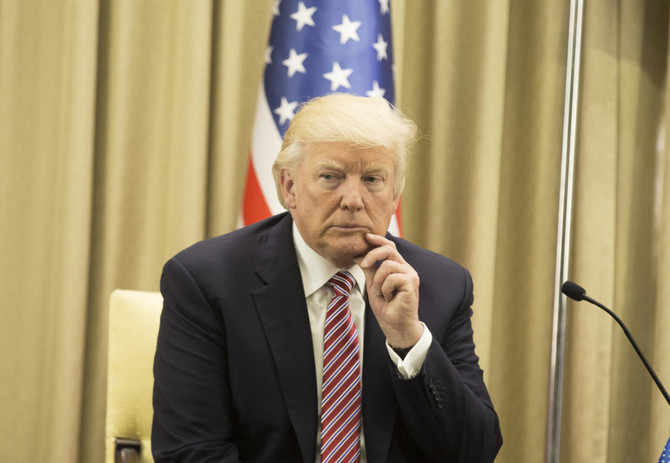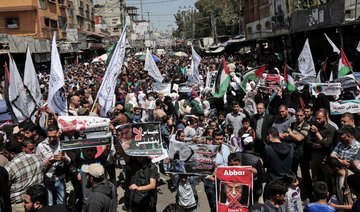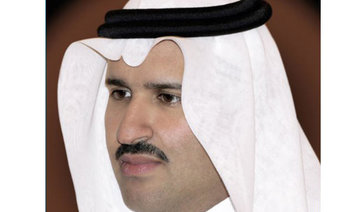BETHLEHEM: Donald Trump makes the short trip from Jerusalem to Bethlehem Tuesday to meet Mahmud Abbas, who hopes to convince the unpredictable US president to remain committed to an independent Palestinian state.
His talks in Bethlehem with the Palestinian president come after Trump on Monday made a heavily symbolic visit to the Western Wall in Jerusalem and met Israeli Prime Minister Benjamin Netanyahu.
Later Tuesday, Trump will return to Jerusalem to visit the Yad Vashem Holocaust memorial and give a speech at the Israel Museum before wrapping up his two-day stop.
Trump's visit to Israel and the Palestinian territories is part of his first trip abroad as president, and follows an initial leg in Saudi Arabia, where he urged Islamic leaders to confront extremism.
He has spoken of reviving long-stalled peace efforts between the Israelis and Palestinians, but few specifics have emerged of how he intends to do so.
Before dinner at Netanyahu's residence on Monday, Trump avoided delving into details.
"I've heard it's one of the toughest deals of all, but I have a feeling that we're going to get there eventually, I hope," he said.
Earlier Monday, Trump also lashed out at Iran, Israel's arch-enemy, saying it should never be allowed to have nuclear weapons and criticising Tehran for supporting "terrorists" -- a reference to militant groups it backs in the region.
He said Iran should have thanked the United States for the 2015 nuclear accord between Tehran and world powers because it led to sanctions being lifted.
"Instead of saying thank you to the United States, they now feel emboldened," Trump said.
In Tehran on Monday, Iran's newly re-elected President Hassan Rouhani ridiculed US strategy in the Middle East, dismissing Trump's summit with Arab leaders in Saudi Arabia as "just a show".
Security will be tight for Trump's journey to Bethlehem, a 20-minute drive from Jerusalem but located across Israel's controversial separation wall.
The wall is part of a project begun in 2002 during the second Palestinian intifada, or uprising, that is to extend some 700 kilometres (450 miles) once completed.
It is a stark symbol for Palestinians of Israel's 50-year occupation of the West Bank, and in Bethlehem the wall has been covered with graffiti and street art.
Trump is to meet Abbas at the presidential palace in Bethlehem, which holds deep significance as the site where Christians believe Jesus was born.
A banner hung in the city said "the city of peace welcomes the man of peace" along with photos of Abbas and Trump.
Hossam Zomlot, an aide to Abbas, said that "if President Trump wants to mediate and leads us to a historic agreement, a major agreement, we are ready to be his partners".
Their talks come with hundreds of Palestinians in Israeli jails on hunger strike since April 17, and activists were hoping to display banners in Bethlehem to drawn Trump's attention to it.
On Monday, Palestinians also held a general strike in support of the prisoners.
Clashes broke out near a checkpoint between Jerusalem and Ramallah involving several hundred stone-throwing youths and Israeli soldiers who responded with rubber bullets and tear gas, leaving at least one wounded.
On Monday night in the Gaza Strip, the Palestinian enclave run by Abbas's rivals Hamas, the Islamist movement organised a demonstration to denounce its labelling as a "terrorist" group by many Western governments, including the United States.
Trump and Abbas met earlier this month at the White House.
Trump initially sparked deep concern among Palestinians when he backed away from the long US commitment to a two-state solution to the conflict.
Meeting Netanyahu in Washington in February, he said he would support a single state if it led to peace, delighting Israeli right-wingers who want to see most of the West Bank annexed.
During his election campaign, Trump also advocated breaking with decades of precedent and moving the American embassy from Tel Aviv to Jerusalem, alarming Palestinians.
He has since said the move was still being looked at.
At the same time, he urged Israel to hold back on settlement building in the West Bank, a longstanding concern of Palestinians and much of the world.
The most high-profile moment of Trump's stay in Jerusalem was his visit to the Western Wall, one of the holiest sites in Judaism.
He became the first sitting US president to visit the site in the Israeli-annexed east of the city.
He was not accompanied by any Israeli leaders during the visit.
Allowing them to do so could have led to accusations that Washington was implicitly recognising Israel's unilateral claim of sovereignty over the site, which would break with years of US and international precedent.
The status of Jerusalem is ultra-sensitive and has been among the most difficult issues in Israeli-Palestinian peace talks, stalled since April 2014.
Israel occupied the West Bank, including east Jerusalem, in the Six-Day War of 1967.
It later annexed east Jerusalem in a move never recognised by the international community and claims the entire city as its capital.
The Palestinians see east Jerusalem as the capital of their future state.
After Israel and the Palestinian territories, Trump will head to the Vatican, and to Brussels and Italy for NATO and G7 meetings.
Trump heads for Bethlehem to see Palestinian leader
Trump heads for Bethlehem to see Palestinian leader

Russia says Israel attacks on Iran are illegal, notes Iran’s commitement to NPT

- The statement said Moscow was waiting for the International Atomic Energy Agency to provide “unvarnished” assessments of the damage caused to Iranian nuclear facilities by Israeli attacks
MOSCOW: Russia’s Foreign Ministry on Tuesday denounced continued Israeli attacks on Iran as illegal and said a solution to the conflict over Tehran’s nuclear program could only be found through diplomacy.
A ministry statement posted on Telegram noted Iran’s “clear statements” on its commitment to adhere to the nuclear non-proliferation treaty and its willingness to meet with US representatives.
The statement also said Moscow was waiting for the International Atomic Energy Agency to provide “unvarnished” assessments of the damage caused to Iranian nuclear facilities by Israeli attacks.
Qatari emir and Turkish president discuss Israeli attacks on Iran

- Sheikh Tamim bin Hamad Al-Thani and Recep Tayyip Erdogan emphasize important need to deescalate conflict and find diplomatic solutions
LONDON: Sheikh Tamim bin Hamad Al-Thani, the Emir of Qatar, and Turkish President Recep Tayyip Erdogan on Tuesday discussed Israel’s ongoing attacks on Iran, which began on Friday and have targeted nuclear sites, military leaders, intelligence chiefs and atomic scientists.
During their call, the leaders emphasized the important need to deescalate the conflict and find diplomatic solutions, the Qatar News Agency reported.
Earlier in the day, the Qatari minister of state for foreign affairs, Mohammed Al-Khulaifi, warned during a call with Rafael Grossi, the director general of the International Atomic Energy Agency, that the targeting of Iranian nuclear facilities by Israel represented a serious threat to regional and international security.
The IAEA reported on Monday that an Israeli airstrike on Iran’s Natanz Nuclear Facility on Friday had damaged centrifuges at the underground uranium-enrichment plant, raising concerns about possible radiological and chemical contamination in the area.
Qatari minister of state, IAEA chief discuss ‘serious threat’ of Israeli strikes on Iran’s nuclear sites

- Mohammed bin Abdulaziz Al-Khulaifi reiterates Qatar’s condemnation of attacks on Iranian territory
- He said targeting nuclear facilities threatens regional, international security
LONDON: The Qatari Minister of State for Foreign Affairs Mohammed bin Abdulaziz Al-Khulaifi on Tuesday discussed the conflict between Israel and Iran with Rafael Grossi, the director general of the International Atomic Energy Agency.
Al-Khulaifi discussed in a call the Israeli attacks on Iranian nuclear facilities that began on Friday, targeting the Natanz, Fordo, and Isfahan nuclear sites.
Al-Khulaifi stressed that targeting nuclear facilities was a serious threat to regional and international security. He reaffirmed Qatar’s commitment to dialogue to resolve conflicts and achieve peace in the region.
The officials discussed ways to improve the security of nuclear facilities and ensure they are safeguarded against threats, the Qatar News Agency reported.
Al-Khulaifi reiterated Qatar’s strong condemnation of the Israeli attacks on Iranian territory, deeming them blatant violations of Iran’s sovereignty and security, the QNA added.
The IAEA reported on Monday that the Israeli airstrike on Iran’s Natanz facility on Friday damaged the centrifuges of the underground uranium enrichment plant, raising concerns about potential radiological and chemical contamination in the area.
US pulls out of two more bases in Syria, worrying Kurdish forces

- The SDF did not respond to questions about the current number of troops and open US bases in northeastern Syria
AL-SHADADI BASE: US forces have pulled out of two more bases in northeastern Syria, visiting reporters found, accelerating a troop drawdown that the commander of US-backed Syrian Kurdish forces said was allowing a resurgence of Daesh.
The reporters who visited the two bases in the past week found them mostly deserted, both guarded by small contingents of the Syrian Democratic Forces — the Kurdish-led military group that Washington has backed in the fight against Daesh for a decade.
Cameras used on bases occupied by the US-led military coalition had been taken down, and razor wire on the outer perimeters had begun to sag.
A Kurdish politician who lives on one base said there were no longer US troops there. SDF guards at the second base said troops had left recently but refused to say when.
HIGHLIGHTS
• No US troops present at Al-Wazir and Tel Baydar bases.
• Daesh threat ‘has significantly increased’, SDF commander says.
The Pentagon refused to comment.
It is the first confirmation on the ground by reporters that the US has withdrawn from Al-Wazir and Tel Baydar bases in Hasaka province.
It brings to at least four the number of bases in Syria US troops have left since President Donald Trump took office.
Trump’s administration said this month it will scale down its military presence in Syria to one base from eight in parts of northeastern Syria that the SDF controls.
The New York Times reported in April that troops might be reduced from 2,000 to 500 in the drawdown.
The SDF did not respond to questions about the current number of troops and open US bases in northeastern Syria.
But SDF commander Mazloum Abdi, who spoke at another US base, Al-Shadadi, said the presence of a few hundred troops on one base would be “not enough” to contain the threat of Daesh.
“The threat of Daesh has significantly increased recently. But this is the US military’s plan. We’ve known about it for a long time ... and we’re working with them to make sure there are no gaps and we can maintain pressure on Daesh State,” he said.
Abdi spoke on Friday, hours after Israel launched its air war on Iran. He refused to comment on how the new Israel-Iran war would affect Syria, saying simply that he hoped it would not spill over there and that he felt safe on a US base.
Hours after the interview, three Iranian-made missiles targeted the Al-Shadadi base and were shot down by US defense systems, two SDF security sources said.
Daesh ruled vast swathes of Iraq and Syria from 2014 to 2017 during Syria’s civil war.




















